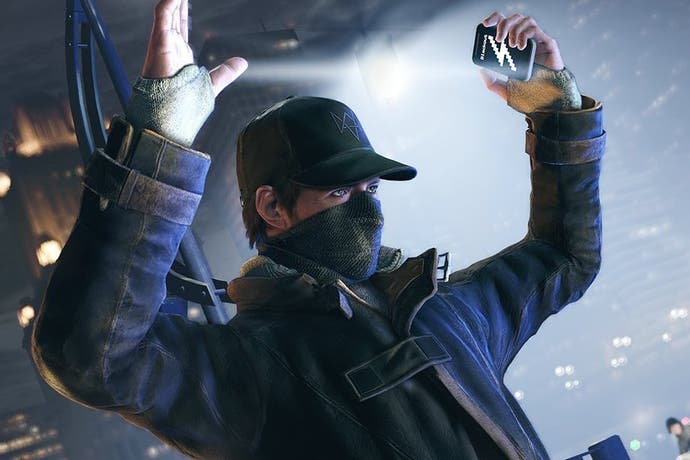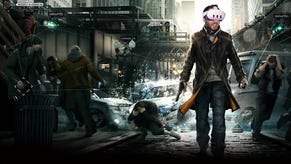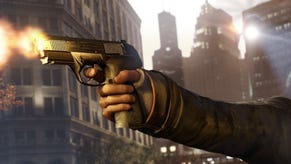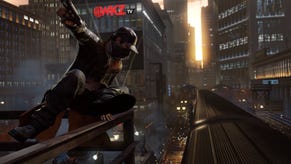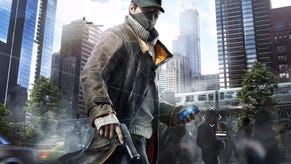Watch Dogs review
Cyber house rules.
"Hacking is your weapon" declares the advertising for Ubisoft's latest franchise-starter, but after more than 30 hours of gameplay it's fair to say that my body count from assault rifles, grenade launchers and stealth kills is far more impressive than anything I can credit to my hacking skills. This is a game about hacking in which hacking very quickly becomes an abstract background.
Instead, Watch Dogs is an often gorgeous, solidly satisfying and efficiently structured run through familiar gameplay motifs: part open-world sandbox, part third-person shooter, part stealth game. As fugitive hacker Aiden Pearce, your journey through a near-future, fully connected Chicago is defined more by the things you expect to do in this sort of game than by any surprising new features opened up by the tech.
Aside from the inevitable debt owed to Grand Theft Auto - over 10 years on from GTA 3, we're still carjacking and stunt-jumping around virtual cities - the echoes of other games are loud. The way Aiden jogs and clambers as he navigates back alleys and rooftops, with you holding down the shoulder button to seamlessly vault and climb, is reminiscent of Assassin's Creed, for example - though without that game's nimble verticality and vertiginous parkour.
You won't be scaling any sheer walls or taking flying leaps here, but you will be barging through crowds and working your way around CtOS towers, each of which unlocks more map icons and side missions. That's much the same as the lookout towers from Assassin's Creed but also identical in function to the enemy outposts of Far Cry 3. Call it Ubisoft's house style, if you like, but it leaves Watch Dogs feeling more like a greatest hits compilation than a distinct title.
Car handling is slick and intuitive, with every vehicle having a unique feel. Hacking makes a small difference here: whether being chased, doing the chasing yourself or simply mucking about, you can change traffic signals to create chaos at junctions or hack steam pipes under the street to create devastating eruptions. The hacking icon attached to such items will flash blue to let you know when to hit the button to take down nearby enemies, leading to more déjà vu: it's Burnout meets Split/Second. These are two fantastic inspirations for vehicular action, to be sure, but it doesn't do much to define Watch Dogs as a game in its own right.
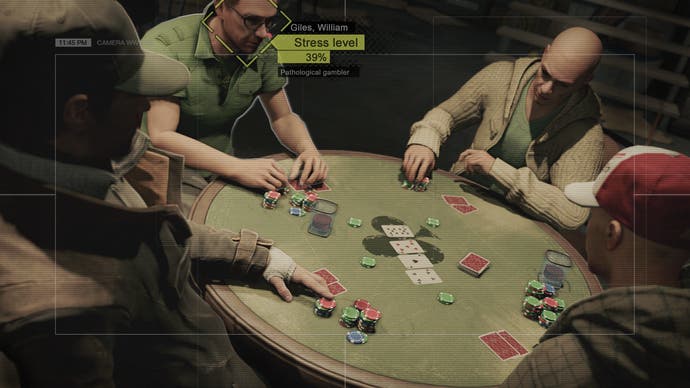
Worse are the cops. They're rarely a problem during the story, outside of scripted missions where your wanted level is artificially boosted, but once they have your scent they turn into maniacal brutes, driving into you at high speed over and over. Escaping them by nifty driving is nigh impossible; you need to hide inside a parking garage and trust the AI to forget you're there, or hop on a train and let it speed you past the perimeter where all crimes are forgotten.
Combat encounters also draw inspiration from existing games, with slightly stiff but workable sneaking and cover mechanics and decent if unremarkable gunplay. These are contained locations which you can work your way through stealthily or just resort to mayhem, and it's here that the hacking makes the biggest difference, as you can hop from one security camera to another, scouting the area and picking off enemies before Aiden even breaks cover. Some guards will carry explosives that you can hack, causing them to panic, and the satisfaction of blowing someone up with their own malfunctioning grenade never gets old. It's only the AI that lets these scenarios down. Enemies are smart up to a point, but can be easily outwitted with simple tricks. It's not unusual for firefights to end with at least one enemy stuck in place somewhere, staring at a wall.
Add in some fun craftable gadgets, such as proximity IEDs and electronic lures, however, and these encounters make for satisfying little sandboxes in their own right. The more abilities you unlock from Aiden's sprawling skill tree and the more weapon types you collect, the more scope you have to approach missions in different ways. As the spine for a 10-hour action game, it would be perfect. Spread out over a lengthy open-world campaign, these moments lose some of their impact.
Crucially, you never actually feel like you're hacking anything. A lot of the time you're just pressing a button to make something happen, which at a functional level is no different to any action game. When you do get to actually hack into things at a system level, it's via a tired old PipeMania-style puzzle where you rotate pieces to guide a blue power line to a goal. If anything underscores how little interest the game has in using "hacking" as anything other than a marketable context for "making cool s*** happen", it's this.
So many of Watch Dogs' ideas have been proven in other games, so it makes sense to use them again, but it does mean that the game never really nails its own identity. It's reliably good yet rarely great; entertaining without being inspired. A strong story or a compelling character could make the difference, but sadly this is where Watch Dogs is at its weakest.
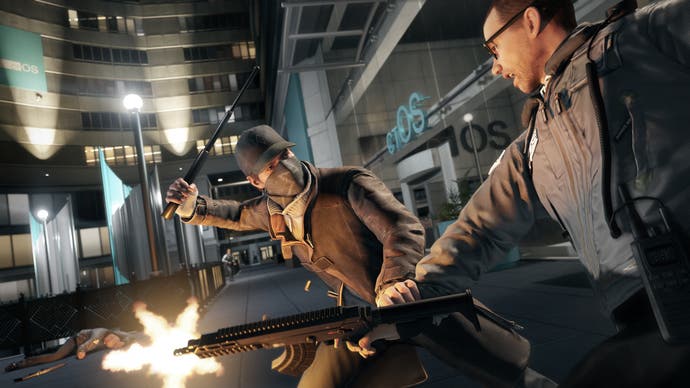
Aiden is already an accomplished hacker when we first meet him, taking part in a bold cyber-heist at an upmarket hotel. He's syphoning funds and data from the city's one per cent when the job goes badly wrong. Aiden flees, but he's rattled the wrong cages and a contract is taken out on him. The net result: a fatal car crash which claims the life of his niece and estranges him from his sister and her son.
The bulk of the plot picks up months later, as Aiden begins tracking down who was responsible and getting his revenge. He has also, in the interim, become a shadowy figure known by the imaginative nickname The Vigilante, delivering brutal computer-assisted justice to the city's criminals.
It's not the most original set-up, but it is one that offers some potentially chewy moral quandaries. Sadly, the limp script avoids every single one of them. Aiden begins the game as an irritating cypher - a growling, vengeance-fuelled thug - but, a few lines of incidental dialogue aside, he is never made to accept his own role in the tragedies that befall everyone around him. He steals, assaults, extorts and murders in order to exact justice for identical indignities inflicted on himself. The hypocrisy goes unchallenged.
As much as the game tries to position him as a high-tech combination of Robin Hood and The Punisher, his actions never reflect this. Take your smartphone out of your pocket and the world is overlaid with hacking opportunities. Details of every person on the street are at your fingertips - this woman has cancer, that man likes porn - and you can also hack deeper to eavesdrop on phone conversations or text messages. It's empowering, but also creepy.
This is a game where you can empty the bank accounts of strangers on the street simply by holding down a button, yet cannot interact with the numerous homeless people begging for change. Aiden tuts at the invasions of privacy he discovers while digging inside the city's systems, yet is privy to far more personal data every time he scans the pedestrians around him looking for useful info to swipe.
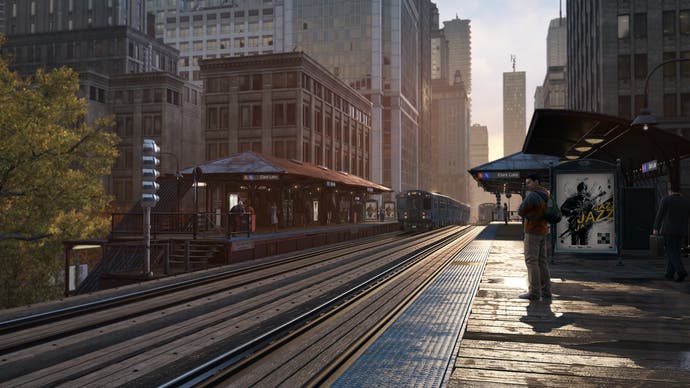
This peculiar lack of empathy for the avatars around you extends into the physical world. You can chase down a petty thief and beat him to a pulp, but can only pocket the money he stole for yourself. Even GTA 5 - that high watermark of amoral sociopathy - gave you the option of returning stolen purses to their owners for a small measure of redemption. You can only ever take, never give back, and Aiden's world is a stiflingly unpleasant and selfish place as a result.
It also leads to a fundamentally broken economy where there's no limit to how much money you can take and no downside to stealing from everyone you see. You can easily amass a small fortune, but there's nothing to spend it on beyond guns and vehicles - almost all of which are freely available in the game world already.
I kept waiting for the game to offer some shift in perspective, some commentary, that made Aiden's insufferable nature more palatable or interesting, but it never came. By the end, he is all but positioned as a superhero. Nor does Watch Dogs have anything to say about the surveillance state, or about questions of privacy and identity in a data-driven world, despite using these topics to drive so much of its gameplay and story.
Visually, the game is on much firmer ground. This digital Chicago stretches from the rundown inner city area known as The Wards through a glittering downtown and up to the rural backwater of Pawnee. The world-building is rich enough that you can read the appropriately fish-themed, hand-written menu of a small café bar on the shore of a lake. On PlayStation 4, the water effects are a highlight, with some of the nicest rain and waves seen in gaming.
There's a sense of sterility beneath the surface, though. As dazzling as the game can look, this Chicago feels like a place you travel through rather than a world you inhabit. Pedestrians gasp and gawp at car crashes, but exhibit no real life. It's like a lavish theme park diorama, impressively detailed but somewhat stiffly staged. It has none of the grungy, lived-in quality that Rockstar brings to its worlds, and the people populating it never surprise you with emergent moments that ring true.
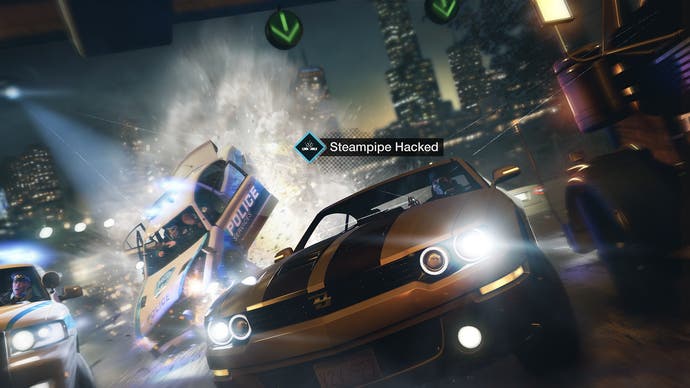
Once the story mode is over - there's no in-game clock for reference, but it took me less than 20 hours to do this - you're left with a map that is full of stuff. There are a few narrative side-quests revolving around a serial killer, arms dealers and human trafficking, as well as simpler fetch-quests: QR codes painted on buildings must be lined up (like the Riddler puzzles in Arkham Asylum - another influence) while "Fixer" missions offer the expected car theft and delivery objectives. All of these icons are easily mopped up since everything is marked on your map for you. GPS and patience, rather than initiative, is all that's needed to rinse this game to 100%.
Some extras are worth a look though, particularly the bizarre "augmented reality" mini-games. Madness is a Carmageddon riff that sees you hurtling around the city splatting demons. Psychedelic has you bouncing from giant holographic flowers. Alone is a survival horror riff with the city populated by stalking robots. Spider Tank lets you blow off steam in a manga-flavoured rampage mode. All are fun for a few rounds, and come with their own upgrade trees.
Multiplayer, too, has its share of highlights. Online races and free-roaming mayhem are passable but predictable. More interesting is CtOS Mobile mode, where one player uses the companion app for tablets and phones to muster law enforcement against a live player, and a suite of tailing and hacking modes where you must hack other players and steal their data without being spotted. It's another lift from Assassin's Creed, using much the same cat-and-mouse motif as that series' multiplayer, but it adapts well to Watch Dogs. These "invasions" can happen while you're playing the campaign, unless you switch them off. Doing so cuts off access to a smaller skill tree of multiplayer-specific upgrades, but it's a price worth paying to be able to finish the story unmolested.
Nobody could accuse Watch Dogs of being miserly. It crams in a lot of stuff to reach that magical 40 hours of gameplay mark. It also leaves the game feeling a little disjointed and desperate and with no single hook on which to hang its wannabe blockbuster credentials. Assassin's Creed launched with a thin game, but there was a sense that there were unique gameplay mechanics beneath its flat surface that were worth pursuing and, for a few sequels at least, those ideas were able to flourish and grow.
Watch Dogs doesn't have that promising kernel. It certainly entertains, but mostly through borrowed concepts, and the central notion that could have made it stand out - the hacking - is the most undercooked of all. It doesn't get anything horribly wrong, but nor does it excel at any of the genre beats it so faithfully bangs out. It's good, and yet that always feels like a criticism when a game comes weighed down by this much hype. You won't regret the time you spend in Aiden Pearce's world, but nor will it be saved as a precious memory when you reboot.
We've got a Watch Dogs guide that will help you beat some of the trickier missions in the game.
